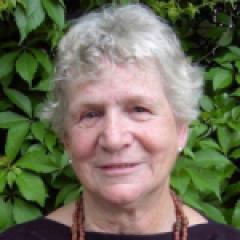Deborah Meier on Education: School as Community
While waxing romantic about families in my last blog, and meaning every single word, I’m also reminded that there’s good reasons behind my concern with using family-like metaphors to describe good schools or good colleagues. The distinctions between them are too important to ignore. One of the most dangerous being that our students already have families whose ties of loyalty usually come before their loyalty to their school and us. That’s how it should be. And the same is probably true for the faculty, of course. We get in trouble when we forget this. But there’s an essential link between what we mean by community and family. It has something to do with trust.
Even within a good family, trust is not 100%. There are times…. and similarly, in the larger world, there are important reasons for families to educate their children in coping with situations that require distrust. For some this wariness covers a broad terrain—and again, wisely so. The wisdom of life experience needs to be passed along to the young, and trust is sometimes the victim.
The necessary tension between trust and distrust is also at the heart of democracy. How to put our own interests first while also not losing sight of our connection with “others"–including the entire species! We’re all dependent on each other in some ways for the health and welfare of the entire planet, our fellow citizens, our tribe, our particular blood-related family….and ourselves. How to wed narrow self-interest to the self-interest of the planet can’t be reduced to an algebraic equation.
Alas.
The balancing act that putting this all together under one roof involves is tricky, yields to no clear formulas or recipes and is in many ways a matter of trial and error.
That’s where democracy comes in. It allows for trial and error. It is a trial and error undertaken by ordinary human beings, who have different self-interests! An impossible dream? Perhaps, but working on it is worthwhile given the alternatives.
Some kind of mutual respect sustains it, enriches it and allows sufficient trust to grow over the centuries? How can one balance such trust with skepticism? What essential character traits makes this more than an idle dream and how do family and school negotiate this balancing act?? It’s a starting point to an education in democracy.
Actually, of course, it starts with the most simple one-on-one relationship of trust between infant and adult caregiver. It grows as the child works out the myriad relationships that effect her life. It includes trusting one’s own judgment—differentiating between levels of reality. This is turn requires settings where the child and later the adult, can keep experimenting, pulling back when necessary, reassigning risks, giving one’s all to a task or a relationship, or not. Making sense of the world starts at birth, and who and how much to trust others is part of this learning experience. It requires, perhaps those “habits of mind” which the Central Park East and Mission Hill schools rested on, plus… certain kinds of life experience. Life experience cannot be replaced by virtual realities or games of trust—but only by new experiences. What then happens when virtual reality replaces other life experience?
Yes, in the end we have to make a leap (of a sort) of faith and treat the “whole world” with some default position of trust — while also applying the habits of mind of skepticism and empathy that we tried to spell at in those Five Habits of Mind (and heart).
That is why I cherish the intimacy that a small school makes possible, the opportunity to be part of every decision made in some form or another as we train ourselves to be citizens of a far more anonymous world—one more like those huge anonymous high schools. At some point too big is too big whether it is several million or a mere few thousand. We can’t sit together and all be heard unless the numbers are far, far smaller. As an expert on nonprofit boards once wrote (I forget the name?), if you want a Board that really has a role to make in policy than make the board small—ideally under 20.
In our attempt to create a staff-run democracy we never quite made it, especially since we did not assume that only certified teachers constituted the “staff”, but we came close. Our classroom sizes followed the same rule. More tricky, even in a small school, is the “school-as-a-whole” democracy where we fell back on representative formats, experimenting all the time with what was policy and what was not, what needed to remain in the hands of each individual and what belonged to the larger community. Our default rule being to leave as much power in the hands of those who must implement policy as feasible. Different circumstances dictated different answers in different schools— for example, how formally autonomous the school itself was, how much choice folks had about being members of the community and how expert the professional staff was.
I would like to use this blog to explore what I learned about democracy over the years of work in these schools and schools like them that may help us think about why small intimate non-virtual relationships are still at the heart of it and the ways I see them endangered. It is why I also hope that e-mail et al won’t replace our once every five years gathering of the clan.
This blog post has been shared by permission from the author.
Readers wishing to comment on the content are encouraged to do so via the link to the original post.
Find the original post here:
The views expressed by the blogger are not necessarily those of NEPC.
